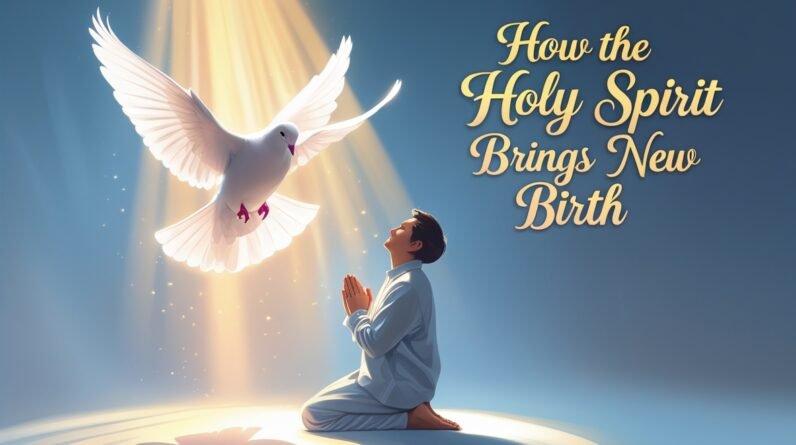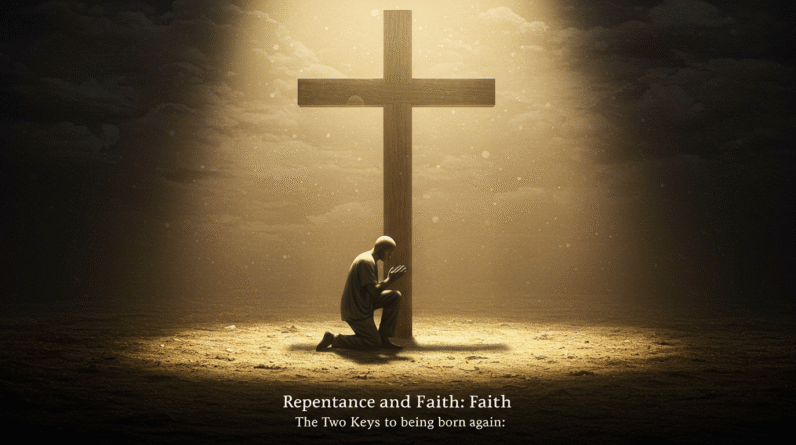Born Again Through Faith: Understanding John 3:16 In A Personal Way
You probably know the shape of John 3:16 without even trying. It gets quoted in stadiums and whispered at bedside vigils; it sits on signs and in song lyrics. But when the words land in your own quiet — when you read them and the room is small and you are still — they can feel like something asking for a real answer from you. This piece is for that moment. It is about what it means for you to be born again through faith, and how the promise in John 3:16 might be not only a sentence you know but an invitation you accept, wrestle with, and live.

Why John 3:16 matters to you
John 3:16 isn’t just famous; it functions as a hinge. The sentence pulls together God, love, giving, belief, and life into a single movement. That matters because believing shapes how you live, and how you live shows what, ultimately, you trust. Reading the verse in the abstract can be comforting enough, but approaching it personally — asking, “Does this mean anything for me today?” — complicates and deepens it. You’re being asked to consider birth and belief not as theological curiosities but as real, existential things.
The verse in plain sight
Here is the verse at the center of this conversation: John 3:16. You can read it quickly and move on. Or you can let it sit with you. The structure is clear: love motivates, giving follows love, belief receives life. You are invited into that exchange. When you do read it closely, you start to notice whose agency is involved and where your responsibility begins — not to earn the love, but to respond to it.
What Jesus means by “born again”
When Nicodemus encounters Jesus, he hears something that sounds impossible: You must be born again. You can see that exchange in context at John 3:3–8. Nicodemus imagines a literal re-entry into the womb; Jesus moves the conversation into new language — a spiritual birth. The point is not to sweat metaphors but to notice that Jesus locates the source of this new life in a different order than your ordinary life. It isn’t about rearranging your résumé; it’s about receiving a different kind of life altogether.
The strange logic of new birth
The logic is intentionally upside-down: being born again is not something you fabricate by trying harder. It’s something you receive, something that happens in you and to you. That flips usual moral frameworks on their head — your achievements are not the currency here. You might find that relieving, or you might find it painfully destabilizing. Either way, the invitation stays: a new life offered, dependent on a new posture toward God.
Faith is the way you are born again
There are practical words tied to this. Consider how the New Testament explains the route to this rebirth: faith. For instance, read what Paul writes about confessing and believing in Romans 10:9-10. He ties faith to an inward turning that means you call Jesus Lord and trust that God raised him. Faith, in that sense, is not just intellectual assent; it is the trusting alignment of your whole self. If you’re exploring what it means to accept John 3:16 for yourself, faith is the mode in which that rebirth enters your experience.
What faith really looks like
Faith rarely looks like fireworks. Often it looks like a hand put out toward help, an admission of need, a steady leaning into someone you trust. In the Christian texts, faith appears again and again as reliance, not as a cocktail of correct doctrinal points. So when you hear the phrase born again faith, picture a posture rather than a proof sheet. It’s the inner orientation that says, “I will live differently because I trust this person will be true to his promise.”
How belief becomes new life
Belief is not a one-off mental tick. Read Paul and then read the echo in other letters: the new life begins and continues as a lived reality. See Paul’s broader teaching on grace and faith here: Ephesians 2:8-9. You are saved by grace through faith; that phrase means the change begins as a gift and is received by trust. Thereafter, you exist in a form that is, in Christian language, reborn.
The active and passive work together
There’s a tension you learn to live with: the rebirth is both given and received. Titus clarifies that washing of rebirth isn’t something you manage for yourself; it’s a renewal by the Spirit and grace, not by works you can tally: Titus 3:5. That doesn’t turn faith into passivity. Rather, it makes your “yes” both honest and humble. You act — through prayer, obedience, repentance — but you act as someone who has already been given life. The phrase born again faith helps you keep that balance in mind: your response is real, but it rests on something deeper than your own capacity.
What this rebirth looks like day-to-day
If being born again is true for you, the change will show up in small places. Not necessarily instantly dramatic, but slowly in habits, affections, and choices. You start to notice your language, the way you treat strangers, the attitudes you used to accept as “just you.” The rebirth is about an orientation that makes compassion more plausible, honesty more tolerable, and courage more likely. It translates into the rhythm of your mornings: prayers you didn’t have before, a Bible passage that anchors your day, a different kind of hope when plans collapse.
Signs and no proof
None of the small changes is a test you pass to prove God loves you. Instead, they’re signs — like the way a plant leans toward light. They aren’t exhaustive or exclusive; people who claim to be reborn behave in many ways, sometimes not very admirable. That is why the internal experience of faith matters. Books and brokered formulas can give you patterns, but your day-to-day reality is where the presence of new life will eventually be most credible.
Doubts, mistakes, and the smallness of faith
You will have doubts. You will do terrible things. You will not feel newly alive every morning. The Christian story is honest about this. You can see the rawness of doubt in the man who asked Jesus to increase his faith and then confessed, “I do believe; help me overcome my unbelief” — the image is almost embarrassingly close to your own contradictions when you read Mark 9:24. Doubt does not disqualify you from being born again; it is part of the terrain.
Learning to live with small faith
Jesus tells you that even faith the size of a mustard seed can move a mountain. That image means your confidence need not be monumental. The path is often incremental. You try, you fail, you repent, you try again. If your faith feels small, that’s not a moral failing to hide but a posture to bring to God. That posture, more than your metrics, is the essence of born again faith: willingness to depend, even when dependence feels weak.
Assurance and security without presumption
You might worry that accepting John 3:16 as personal means living with a fragile certainty: what if you’re wrong? The New Testament gives you language for assurance that doesn’t turn into arrogance. Read John’s pastoral letter where he writes explicitly about knowing you have eternal life: 1 John 5:13. Assurance, in this context, comes from God’s record and the Spirit’s testimony, not your perfect performance. It’s a confidence that steadies you, not a ticket that lets you act without conscience.
Not a license, but a foundation
Assurance should not be used as a pretext for shallow living. You are invited into secure confidence so that you can be generous, honest, and brave in the world. Secure foundations don’t encourage apathy; they free you to risk love again. That is part of the strange logic of the gospel: security that makes you more vulnerable, not less.
Confession, repentance, and the posture of a changed life
Belief interacts with repentance and confession. Peter called people to turn and be baptized for the forgiveness of sins in his first sermon: Acts 2:38. Turning here is not a cold, legalistic ritual but a lived reorientation — a continual turning—away from what drags you down and toward God’s life. Repentance is not a one-time ticket but a habit, a re-education of your desires.
The difference between shame and shame-removal
Confession isn’t about shaming yourself into holiness. It’s about naming what’s true and letting it be reshaped. When you confess, you don’t lose dignity; you reclaim honesty. That reclaiming is part of what makes rebirth credible: someone willing to be accountable, honestly seeing their failure and choosing differently because a new life has begun.
Common objections you might have
You will encounter objections — from friends, from your own logic, from the books you read. “Isn’t religion just consolation?” “How can you know?” “What about those who never hear?” Many of these questions are not rhetorical traps but real queries that deserve thoughtful answers and humility. The Christian tradition has wrestled with such matters for centuries; your questions can be part of that ongoing conversation. Often, you find that the theological answers matter less than the moral and existential honesty behind your questions.
The most urgent objections
One urgent objection is fairness: if God saves by faith, what about those who never had the chance? Another is authenticity: does faith mean pretending certainty? The answers are nuanced and often pastoral rather than purely logical. You can trust that God’s justice and mercy are bigger than your initial categories, and that living truthfully with imperfect knowledge is part of what God invites you to do.
Becoming born again in practice: steps you can take
You don’t need a dramatic script to begin living out the truth of John 3:16. A few practical gestures can open you to the change: read the verse and other passages in context, talk with someone you trust about it, pray honestly about your need and your doubts, and invite community into your journey. Paul’s instruction that confession and belief are part of the turn to Christ in Romans 10:9–10 can be lived out concretely: say who Jesus is to you, and mean it in your life. These are small moves, but they are not trivial.
Rituals that mean something
Baptism, prayer, and participation in community are not magic. They are practices that shape you. Baptism is a public act of identification with the death and resurrection language that roots new life; prayer is the daily conversation that rewires your heart; community is the scaffold that keeps you from isolating into either pride or despair. Together, these practices make your born again faith something you inhabit rather than merely affirm.
Conversations to have (with God, with others)
When you say “I want to be born again,” you are entering a conversation with God and with people. Talk to someone who’s been walking this road, not necessarily loudly, but honestly. Ask how faith changed them, what it cost, what it freed them for. Pray with language that matches your reality. You can say, “I believe, help my unbelief,” and mean it; that prayer is a good place to start. Conversations will show you that the Christian life is not solitary heroism but a communal unfolding.
How to bring honesty into the community
Don’t hide your contradictions. Good spiritual conversations happen in the light of honest confession about motives, failures, and hopes. In the community, you’ll learn that people are often less sure than they seem and that unstable ground is a space where real growth happens. Born again faith grows best when it’s not a secret performance but a shared journey.
When those around you react poorly
You may face suspicion, mockery, or even hostility when you begin to live differently. Families and friends can be alarmed when a person’s life takes a new shape. The world knows many versions of zeal it doesn’t trust. That’s why humility is crucial: you’ll need to hold your certainty loosely, be patient with those around you, and let your life argue for your faith more than words do.
A posture for difficult relationships
Respond with steadiness rather than cleverness. Sometimes the gentlest thing you can do is remain the same faithful friend you were before, allowing your life to be your primary testimony. In other cases, boundaries are necessary if relationships become abusive. A born-again life does not mean staying in toxic situations out of misplaced obligation.

Living as someone reborn through faith in public
There’s a tension between private conviction and public embodiment. To live faithfully in public means you will be noticed — sometimes admired, criticized. You will have to navigate ethics, work, money, sex, and politics with principles shaped by your new life. That doesn’t give you a checklist for every dilemma, but it gives you a habit of asking, “What aligns with the life God is giving me through faith?”
Ethics as a practice, not a scoreboard
You will fail. You will be forgiven. Then you will try again. That pattern is the DNA of a life shaped by grace. It’s not about ticking boxes; it’s about being steadily re-formed to love more like the God described in John 3:16.
Resources and where to read more
If you want to keep reading the primary texts, the Gospels are the obvious place to stay. Start with the passages mentioned here: John 3:16, John 3:3–8, and John 1:12. For how faith functions in practice and theology, the Pauline letters are particularly helpful: Romans 10:9–10 and Ephesians 2:8–9. To understand renewal language: Titus 3:5. For candid pastoral encouragement on doubt, look at Mark 9:24. For assurance: 1 John 5:13. For turning and confession in the early church: Acts 2:38.
How to use these resources
Read slowly. Take notes. Pray questions back into the text. Find a translation that doesn’t feel like a foreign language. Bible Gateway or similar sites will let you compare translations, and that’s often helpful — you sometimes see the same phrase in a new shade. Pair reading with a trusted listener: theology grows best when it’s not only an individual hobby but a shared practice.
Final encouragement
If you are leaning into this, you are doing the right thing by not pretending you already have everything figured out. Born again faith is not a badge you wear to be more respectable; it’s a rhythm you learn by paying attention to small, consistent acts of trust. Start where you are. Open the verse at John 3:16 again, read it aloud, say the words as if they could be true for you — because they are meant to be. Let your life be a slow essay in what it looks like to be loved and then to love in return.
Explore More
For further reading and encouragement, check out these posts:
👉 7 Bible Verses About Faith in Hard Times
👉 Job’s Faith: What We Can Learn From His Trials
👉 How To Trust God When Everything Falls Apart
👉 Why God Allows Suffering – A Biblical Perspective
👉 Faith Over Fear: How To Stand Strong In Uncertain Seasons
👉 How To Encourage Someone Struggling With Their Faith
👉 5 Prayers for Strength When You’re Feeling Weak

📘 Jesus and the Woman Caught in Adultery – Grace and Mercy Over Judgement
A powerful retelling of John 8:1-11. This book brings to life the depth of forgiveness, mercy, and God’s unwavering love.
👉 Check it now on Amazon
As a ClickBank Affiliate, I earn from qualifying purchases.
Acknowledgment: All Bible verses referenced in this article were accessed via Bible Gateway (or Bible Hub).
“Want to explore more? Check out our latest post on Why Jesus? and discover the life-changing truth of the Gospel!”








